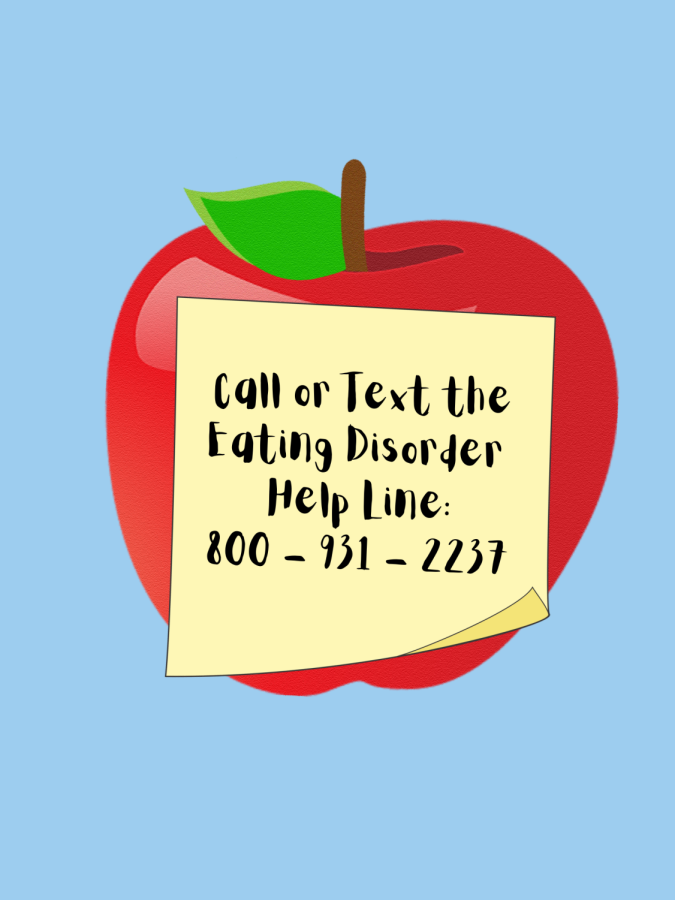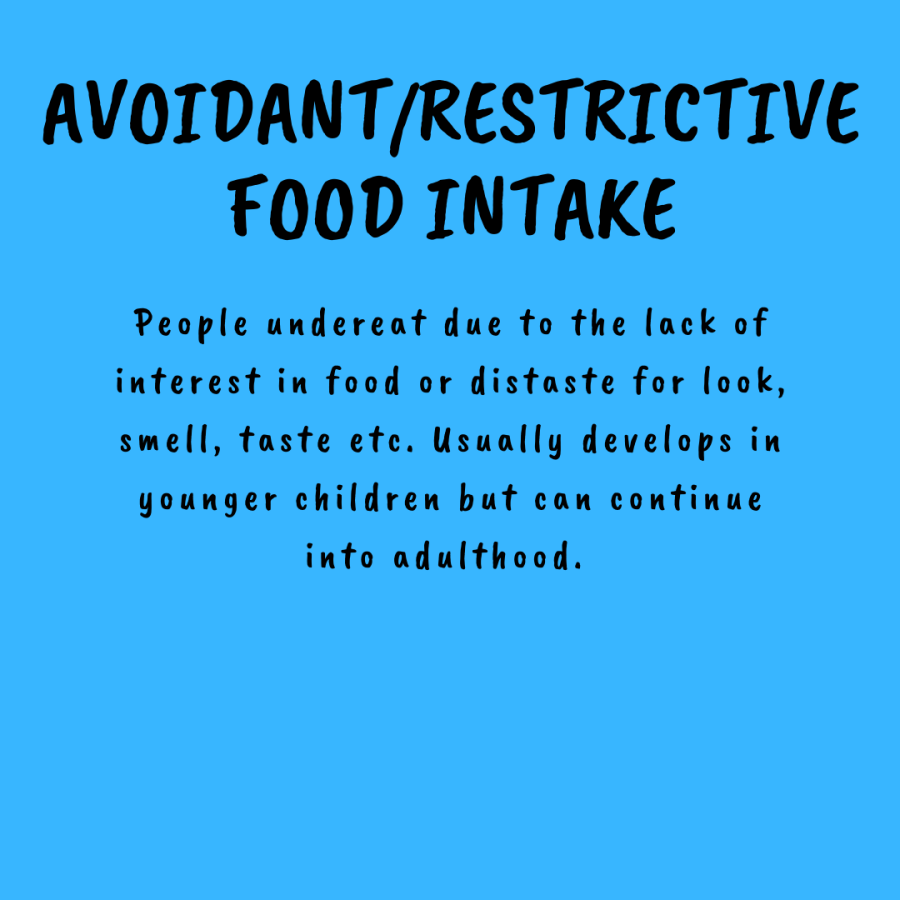Beyond the Food: Identifying the Symptoms and Mental Effects of Eating Disorders
If you or someone you know is struggling or could be struggling with an ED please call or text the helpline to get help and more information.
March 11, 2022
Over 500,000 teens between ages 13 and 18 have an eating disorder (ED). This number only includes those who are medically diagnosed with an ED, and it is constantly on the rise.
Many teens and young adults suffer from EDs, but they may not even know that they have one, or the severity of it. There’s a lot more to eating disorders besides eating “too little” or “too much,” and being able to identify them in either yourself or others can help save someone’s life.
Eating disorders are a type of mental health condition identified by severe disruption in eating-related behaviors, thoughts, and emotions.
There are around 12 types of eating disorders, the top six include Anorexia Nervosa, Bulimia Nervosa, Binge Eating Disorder, Pica, Rumination Disorder, and Avoidant/Restrictive Food Intake Disorder. To learn more about each eating disorder, check out the gallery at the end of the story.
Eating disorders are often developed in teenage and young adult years, but that doesn’t limit EDs to one specific age group. Anyone aged from only a few months to their elderly years can develop an eating disorder.
The exact cause of EDs is not entirely known, just like a lot of other mental illnesses, but according to Mayo Clinic, some factors include biological complications and genetics such as changes in a person’s brain chemicals and/or having genes that put people at higher risk for developing one.
In addition, psychological and emotional factors can also play an immense role in developing an eating disorder, including, but not limited to: having a sense of perfectionism, impulsive behaviors, troubled relationships, and low self-esteem.
According to the National Eating Disorder Association, emotional/behavioral symptoms include: being obsessed with weight, food, calories, dieting, restricting certain foods and even entire food groups, or even skipping entire meals.
Extreme concern about body size and shape and throwing up due to not enough nutrition or to lessen the calories consumed are also symptoms.
Additionally, physical symptoms can include fluctuations in weight (both up and down), dizziness/fainting, sleeping problems, and extremely dry skin/hair.
A Pattonville High student who did not want to be identified described their experience with discovering they had an eating disorder.
“I realized I had an eating disorder when I would constantly workout four times a day and sometimes stay up till 12 am without eating anything but drink tea because I felt I wasn’t skinny enough,” they said. “This was going on for about a couple weeks and then I started to notice I had a problem when I would measure my thighs with a tape measure every 2 hours hoping I was getting skinnier.”
They later were able to get diagnosed with mild anorexia nervosa and body dysmorphia.
Aside from the personal physical effects of having an eating disorder, a lot of psychological and social factors are also hindered.
Eating disorders can bring about arguments between family, friends, and relationships and cause extreme worry and stress to others close to them. And this is a result of a lot of victims of EDs feeling out of control and helpless of their lives, having an increased amount of anxiety, self-doubt, and guilt.
In addition, a lot of victims can develop obsessive, compulsive behaviors as well as feelings of loneliness and not fitting in.
Eating disorders do not only personally damage a person’s mental and physical health, but they also harm their relationships with others. It can cause disruption in the person’s family due to arguments about treatment. They can also destroy relationships with friends or significant others.
Overall, EDs cause extreme worry and stress to the loved ones of the individual who is struggling with one.
For the anonymous student, they had difficulty getting their family to recognize they had an ED.
“My dad was in denial and didn’t even acknowledge that I have an eating disorder in the beginning which caused problems within my family because they were trying to get him to realize how serious it is,” they said.
On the other hand, they also had a tremendous amount of support from the rest of their friends and family. “My friends and the majority of my family are very supportive and work together which ultimately helps me overall.”
With the damage EDs can do physically, emotionally, and mentally, it is important to be able to get help as soon as possible. There isn’t one specific “fix” for EDs, but going to counselors and doctors helps tremendously.
For the Pattonville student, they did just that thing. “I am getting help from two wonderful women,” they said. “And in my opinion, my anorexia nervosa has gotten slightly better. I don’t faint anymore nor measure myself but I still count calories and struggle with having a similar diet as I did before, but I continue to put in effort and I hope to get better someday.”
While it can be hard to recognize the signs of an eating disorder, it is important to be on the lookout for your friends and family. If you or anyone you know is struggling or could be struggling with an eating disorder, call or text (800) 931-2237.
To find out more about the eating disorders previously listed check the gallery below.



